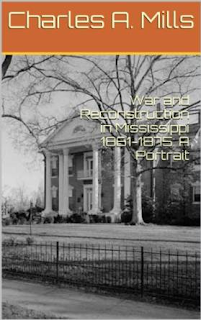On January
9, 1861, the state of Mississippi
seceded from the Union giving its reasons in a
“Declaration of the Immediate Causes which Induce and Justify the
Secession of the State of Mississippi from the Federal Union.”
“In the momentous step which our State has taken of
dissolving its connection with the government of which we so long formed a
part, it is but just that we should declare the prominent reasons which have
induced our course.”
“Our position is thoroughly identified with the institution
of slavery-- the greatest material interest of the world. Its labor supplies
the product which constitutes by far the largest and most important portions of
commerce of the earth. These products are peculiar to the climate verging on
the tropical regions, and by an imperious law of nature, none but the black
race can bear exposure to the tropical sun. These products have become
necessities of the world, and a blow at slavery is a blow at commerce and
civilization. That blow has been long aimed at the institution and was at the
point of reaching its consummation. There was no choice left us but submission
to the mandates of abolition, or a dissolution of the Union,
whose principles had been subverted to work out our ruin.”
“That we do not overstate the dangers to our institution, a
reference to a few facts will sufficiently prove.”
“The hostility to this institution commenced before the adoption
of the Constitution, and was manifested in the well-known Ordinance of 1787, in
regard to the Northwestern
Territory.”
“The feeling increased, until, in 1819-20, it deprived the
South of more than half the vast territory acquired from France.”
“The same hostility dismembered Texas and seized upon all the territory
acquired from Mexico.”
“It has grown until it denies the right of property in
slaves, and refuses protection to that right on the high seas, in the
Territories, and wherever the government of the United States had jurisdiction.”
“It refuses the admission of new slave States into the Union and seeks to extinguish it by confining it within
its present limits, denying the power of expansion.”
“It tramples the original equality of the South under foot.”
“It has nullified the Fugitive Slave Law in almost every free State in the Union and has utterly broken the compact which our
fathers pledged their faith to maintain.”
“It advocates negro equality, socially and politically, and
promotes insurrection and incendiarism in our midst.”
“It has enlisted its press, its pulpit and its schools
against us, until the whole popular mind of the North is excited and inflamed
with prejudice.”
“It has made combinations and formed associations to carry
out its schemes of emancipation in the States and wherever else slavery exists.”
“It seeks not to elevate or to support the slave, but to
destroy his present condition without providing a better.”
“It has invaded a State and invested with the honors of
martyrdom the wretch whose purpose was to apply flames to our dwellings, and
the weapons of destruction to our lives.”
“It has broken every compact into which it has entered for
our security.”
“It has given indubitable evidence of its design to ruin our
agriculture, to prostrate our industrial pursuits and to destroy our social
system.”
“It knows no relenting or hesitation in its purposes; it
stops not in its march of aggression and leaves us no room to hope for
cessation or for pause.”
“It has recently obtained control of the Government, by the
prosecution of its unhallowed schemes, and destroyed the last expectation of
living together in friendship and brotherhood.”
“Utter subjugation awaits us in the Union,
if we should consent longer to remain in it. It is not a matter of choice, but
of necessity. We must either submit to degradation, and to the loss of property
worth four billions of money, or we must secede from the Union
framed by our fathers, to secure this as well as every other species of
property. For far less cause than this, our fathers separated from the Crown of
England.”
“Our decision is made. We follow their footsteps. We embrace
the alternative of separation; and for the reasons here stated, we resolve to
maintain our rights with the full consciousness of the justice of our course,
and the undoubting belief of our ability to maintain it.”
Mississippi was the second state to secede from the Union,
following South Carolina which had seceded on December 20, 1860.
War and Reconstruction in Mississippi 1861-1875: A Portrait
The Great Northern Rebellion of 1860 (alternate history)

























